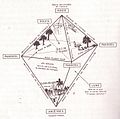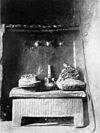Portal:Traditional African religions
Introduction The beliefs and practices of African people are highly diverse, and include various ethnic religions. Generally, these traditions are oral rather than scriptural and are passed down from one generation to another through narratives, songs, and festivals. They include beliefs in spirits and higher and lower gods, sometimes including a supreme being, as well as the veneration of the dead, use of magic, and traditional African medicine. Most religions can be described as animistic with various polytheistic and pantheistic aspects. The role of humanity is generally seen as one of harmonizing nature with the supernatural. (Full article...) Selected articleTraditional healers of Southern Africa are practitioners of traditional African medicine in Southern Africa. They fulfill different social and political roles in the community, including divination, healing physical, emotional and spiritual illnesses, directing birth or death rituals, finding lost cattle, protecting warriors, counteracting witchcraft, and narrating the history, cosmology, and myths of their tradition. There are two main types of traditional healers within the Nguni, Sotho-Tswana, and Tsonga societies of Southern Africa: the diviner (sangoma), and the herbalist (inyanga). These healers are effectively South African shamans who are highly revered and respected in a society where illness is thought to be caused by witchcraft, pollution (contact with impure objects or occurrences) or through neglect of the ancestors. It is estimated that there are as many as 200,000 indigenous traditional healers in South Africa compared to 25,000 Western-trained doctors. Traditional healers are consulted by approximately 60% of the South African population, usually in conjunction with modern biomedical services. Selected imagesFestivalsThere are several religious festivals found in the various Traditional African religions. Some of these are listed below next to their corresponding religion :
Selected biography
Soumaoro Kanté (var.: Sumanguru Kanté) was a 13th-century king of the Sosso people. Seizing Koumbi Saleh, the capital of the recently defunct Ghana Empire, Soumaoro Kanté proceeded to conquer several neighboring states, including the Mandinka people in what is now Mali. However, the Mandinka prince Sundiata Keita built a coalition of smaller kingdoms to oppose him at the Battle of Kirina (c. 1235), defeating the Sosso and leaving Sundiata's new Mali Empire dominant in the region.
Soumaoro Kanté is portrayed as a villainous sorcerer-king in the national epic of Mali, the Epic of Sundiata. Selected quote
On the influence of African religion on art, Aloysius M. Lugira (2009), quoting Ladislas Segy (1975), Source: African Traditional Religion, Third Edition, 2009 by Aloysius M. Lugira, quoting Ladislas Segy, "African Sculpture Speak",Da Capo Press (1975), p. 118, ISBN 9780306800184
Did you know
Related portalsTopicsFor more Traditional African religion topics, see Category:Traditional African religions.
CategoriesWikiProjectsThings you can doAssociated WikimediaThe following Wikimedia Foundation sister projects provide more on this subject:
Discover Wikipedia using portals |






































